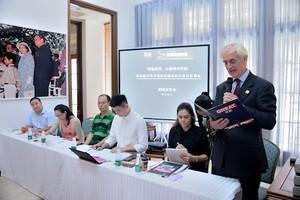
University textbooks in mainland China largely ignore LGBT (lesbian, gay, bisexual and transgender) issues and when they do address them the information is often inaccurate and portrays the community as psychologically abnormal.
This pathologization of the LGBT community was the main conclusion of groundbreaking report, “Homosexuality Contents in University Textbooks”, released recently by the Gay and Lesbian Campus Association of China (GLCAC).
The report was launched at a special press conference in Guangzhou organized to draw attention to LGBT issues in China, which was attended by dozens of reporters, NGO representatives and students.
UNESCO Bangkok was invited to share its institutional experience in responding to challenges posed by homophobia and transphobia in educational settings, in the Asia-Pacific region and globally.
The GLCAC report examined more than 100 university textbooks in fields such as psychology, medicine, mental health and sex education to determine whether they took LGBT needs into consideration and whether the information provided about homosexuality was in line with international standards.
The results were troubling.
LGBT issues were mostly relegated to textbooks for select courses such as abnormal psychology, medicine and mental health education. Of these textbooks, more than half portrayed LGBT people in negative and inaccurate terms and the psychology books largely ignored the mental health needs of the community.
Fewer than 20% of the textbooks surveyed provided objective and non-discriminatory descriptions of LGBT people.
The misinformation in the textbooks not surprisingly had a negative effect on the personal lives of LGBT students, causing them anxiety, depression and fear as well as giving rise to tensions with teachers.
Speakers at the press conference pressed the Chinese Education Ministry to take action to push for the textbooks to be revised with accurate information.
UNESCO Bangkok’s Prempreeda Pramoj Na Ayutthaya, HIV and AIDS National Programme Officer, shared the office’s experiences “working in education and through education” to combat stereotyping and discrimination against LGBT people in educational settings.
“Every child has the right to an education,” Ms Prempreeda said, “and UNESCO’s approach aims to expose obstacles rooted in discrimination that interfere with this right, such as homophobic and transphobic bullying, and negative depictions of LGBT people in textbooks.”
UNESCO focuses its efforts on promoting changes to school curricula as well as teacher training to address this. This rights-based approach is in keeping with UNESCO and wider UN frameworks such as the Education for All (EFA) goals, the Convention on the Rights of the Child and UNESCO’s Convention against Discrimination in Education.
Ms Prempreeda said that China was not alone when it came to discriminatory content found in school textbooks. She pointed out a recent online campaign spurred by a health education textbook for seventh graders in Thailand that referred to transgender people as “someone with a false sense of gender consciousness”. Organizations and individuals who disagreed with that description began an online campaign calling for the textbooks to be taken out of circulation.
“It became a hot issue on Thai social media,” she said. “UNESCO Bangkok will take action in the follow-up stage to encourage revisions to these textbooks that incorporate accurate information regarding LGBT people.”
Allen Chen, Executive Director of the GLCAC, appreciated UNESCO’s involvement and encouraged the organization to partner with NGOs on the mainland to advance these issues.
“In China, many non-governmental organizations work alone for equal rights of LGBT people. I urge UNESCO to help facilitate dialogue between non-government organizations and the government on LGBT issues.” he said.
The press conference was co-organized by Sun Yat-Sen University’s Sex/Gender Education Forum as well as the school’s Sex/Gender Education Forum and held at the British Council, with the support of the British Consul-General in Guangzhou, Alastair Morgan (pictured, top).
Contact: Prempreeda Pramoj Na Ayutthaya (p.pramoj@unesco.org)
